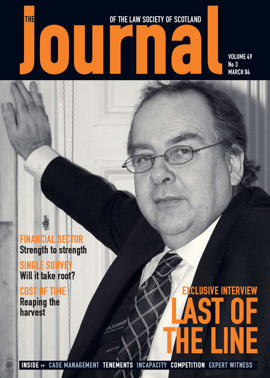Consumers and their guardians
Competition in the profession
One of the most positive assessments of the legal profession in Scotland was published in February. There was little fanfare for the European Commission’s Report on Competition in Professional Services, but the news for Scotland was good.
This was the report which some said would herald deregulation of the legal profession across Europe. It did the opposite. The report tackled the difficult issue of how to balance competition in the legal services market which benefits consumers with the very real need to ensure that proper safeguards are in place to protect consumers. These are the sort of safeguards well recognised in the Scottish profession – professional indemnity insurance, proper entry requirements for admission, rules against conflict of interest and protection of the independence of legal advice. The Commission acknowledged from the outset in its report that professional rules are essential to the proper functioning of the market and the protection of consumer interests. It reviewed rules across the EU and across a number of professions and earmarked rules restricting the kinds of fees charged, admission requirements and advertising restrictions in various jurisdictions. Scottish solicitors easily met and often exceeded the criteria set out in terms of regulation and the competitive environment in which they work.
We are not resting on any laurels however. We recognise that ensuring our rules are appropriate and proportionate is a continuous process of evaluation and revision. The report invited professional and regulatory bodies to review their rules in the light of the report. That is already underway in Scotland.
The Scottish solicitors’ profession has an enviable reputation in Europe for its standards and forward looking approach to the provision of legal services; often we hear only the negative comments. Those who find it easier to criticise should recognise the value the profession brings to our justice system. We have an efficient, cost effective regulatory system operating at no cost to the taxpayer.
I trust that the Department of Constitutional Affairs and those involved in competition, regulation and representing consumers will pay heed to the Monti Report and ensure that any proposals coming out of the Clementi review for further deregulation are truly in the interests of clients. As some press for such radical deregulation, the voice of clients’ interests in the core values of the profession, especially the provision of quality advice and unrivalled consumer protections, must be heard. There is a risk of losing sight of the consumer’s interests if we surrender to a headlong rush to open the market to competition.
Who represents the consumer?
Solicitors represent consumers; the profession is, after all, consumer led. Yet many of the changes we face could increase choice but compromise the consumer in the long run. The Justice 1 Committee looked at regulation in Scotland in 2002 and issued its report; the Society has assessed each recommendation and is already implementing most of the changes and improvements recommended. The Committee decided in February that the inquiry would not be reopened and are currently following up on progress made by the Scottish Executive and the Faculty of Advocates. The Society has already issued to the Committee a report on its progress since the regulation inquiry. The Society also started a new complaints procedure in September last year.
Recently the Consumers Association placed a series of adverts in the press asking only for people who feel they have had “a shoddy service from a solicitor” to contact them. I am not at all sure if this will give any reflection of the current situation. I also question what value the Consumers Association expect to bring to the debate especially as they showed no interest in the Justice 1 Committee’s comprehensive inquiry; perhaps the interest lies more in negative publicity to sell their magazine than providing positive suggestions for improvement.
I would like to make a plea for consumer organisations to address issues affecting most consumers and not just the (thankfully) relatively small number who have a complaint against their solicitor. What could be of more importance than working to ensure that professional standards and protections such as the Guarantee Fund and Master Policy for Insurance exist and are maintained in the professions where consumers must put their faith in a qualified professional to give them the right advice or the right medical or dental treatment? What about the protection of vulnerable people? Who can they rely on for the highest standards of client care? That is what the Society’s different functions from regulation to law reform, to professional practice, work together to achieve – representing people’s rights and interests.
In Europe the Bars – not the consumer bodies – have been pressing for professional indemnity insurance to be mandatory so that clients who lose as a result of a lawyer’s negligence, are protected. This pressure is coming from lawyers who wish to see their clients protected – not from those who claim to have their interests at heart.
In this issue
- Consumers and their guardians
- For the United Kingdom?
- Law meets its maker
- Falconer's safe landing
- Competition and the solicitor
- Flying the flag in finance
- Last piece of the jigsaw
- A good year for most firms
- System addicts
- Putting theory into practice
- The corporate challenge
- Make money out of IT
- A first-rate presentation
- The usual experts?
- Obituary: David Stewart Williamson
- Pearls of wisdom
- Work in progress
- The quality assurance scheme
- Fair hearing with prior knowledge?
- Scottish Solicitors' Discipline Tribunal
- Managing the timetable
- Are landlords' fears justified?
- Caps the stars don't want
- Website reviews
- Book reviews
- Best foot forward?
- The new law of real burdens






